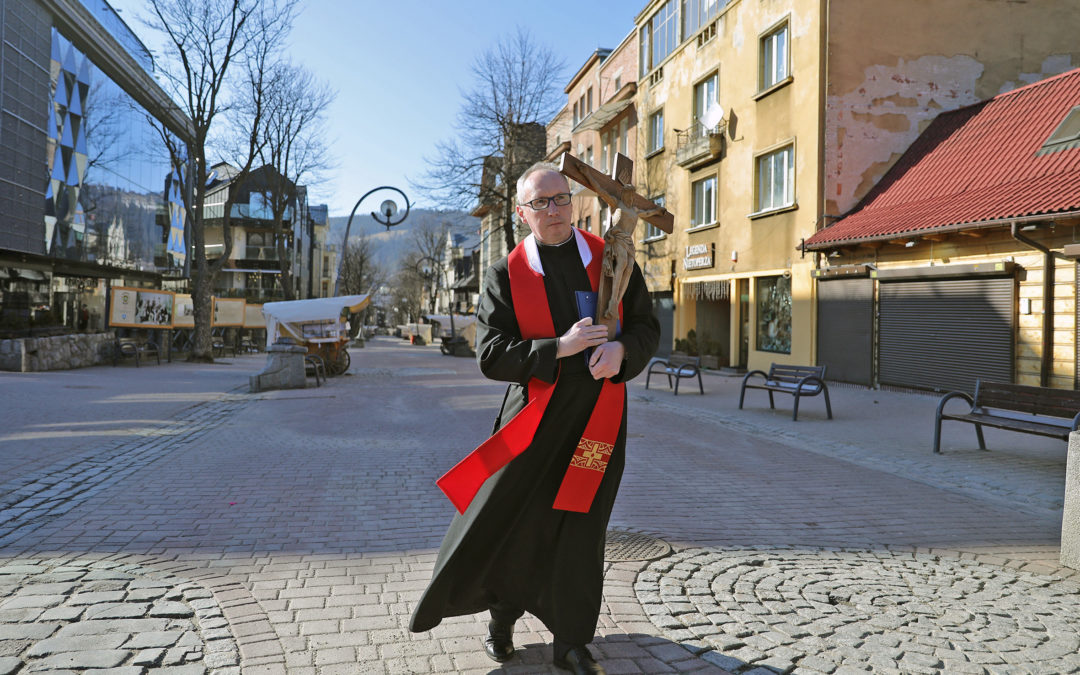By Paulina Olszanka
Much like every year, Father Wojciech Drozdowicz of the Bielany parish in Warsaw saw in the beginning of the Holy Week by leading his congregation in the Palm Sunday procession. With three other clergymen, he walked solemnly along the outskirts of the nave, chanting the liturgical sermon in Medieval Latin and waving palm fronds to commemorate the beginning of the Easter holiday.
At the pulpit, he addressed his congregation: “You are not here with us,” he pointedly said to an empty church, “We will try to celebrate anyway.” Relegated to their living rooms by strict coronavirus restrictions that ban religious attendance of more than five people, Drozdowicz’s parishioners could only watch the religious proceedings from home via Facebook Live.
As Poland heads into its fifth week of lockdown, and with the government, Vatican and Polish episcopate repeatedly issuing stay-at-home decrees, Poles have had to come to terms with the fact that they will be sitting these Easter holidays out. For many, it’s a sign that what was supposed to be over within a few weeks has taken on new, interminable dimensions.
"Give up Easter gatherings" this year, advised Polish state TV news this evening, reporting on advice by the health ministry and Catholic Episcopate to move traditional family gatherings and religious practices online as much as possible pic.twitter.com/WLyhIwhJPe
— Notes from Poland ?? (@notesfrompoland) April 5, 2020
“Traditions like Easter give the year its rhythm”
Easter is the holiest Catholic holiday in Poland, and the original lockdown period was supposed to end before Sunday so that Poles could attend holy mass. But with coronavirus cases here steadily climbing the exponential curve and the peak of infections expected to arrive some time next week, the conservative government and episcopate have had no choice but to give up the holiday and urge the faithful to stay home instead.
Poles will therefore spend the week in much the same fashion as they have the previous four — at home, in limited company and mediating their relationships through Facetime and Zoom.
“My life has been completely turned upside down by this whole thing,” says Maria Urbańska, a 41-year-old customer services manager from Gdańsk.
“I’m homeschooling my son. My fiance and I are working from home. We’re supposed to be renovating the house and I have a wedding planned in June. Traditions like Easter are important – they give the year its rhythm and they’re an opportunity to maintain family ties – but this year we’re only going to have a modest meal and talk to my parents over video link.”
Over 90% of the Polish population identify as Catholic, and the upheaval means that for many of them this will be the first time they forgo the liturgy in person. Considered to be the oldest ritual in the Christian calendar, Easter commemorates the resurrection of Jesus Christ, and in the Polish tradition it is naturally coupled with older, pagan traditions around spring and rebirth, like egg painting and water festivals.
“Even though I’m not religious, we always went to the church”
Though the Polish Church has promised to make viewing of the Holy Triduum – Maundy Thursday, Good Friday, Easter Saturday – available online, many of the more intimate, colourful traditions that Poles are attached to will have to be cast to the side.
“For almost 20 years now I’ve been involved with a church choir, meeting for three hours every Saturday of the Lent to prepare music for the Easter Triduum services,” says Kamila Trajnerowicz, a 38-year-old interpreter from Warsaw.
“This year this was outright cancelled. I’m going to miss the typical format of the Holy Week liturgy, with the church packed with people and the choir singing with all its might – but that’s more a change of form than a change of essence; the liturgy will carry on webcast live.”
“It doesn’t really feel like a time for celebration. It’s difficult, because Easter is really important to me,” says Daria Jakubczyk, a 24-year-old student from Wrocław.
“Even though I’m not religious, we always went to the church with the holy basket to bless the eggs, and I always did that with my mum. I think I’ve only ever done it once without her. I always helped out with the baking, and though I’ll probably make a lemon cake this time, I don’t really feel like decorating it.”
The traditional blessing of food on Holy Saturday will not take place in Polish churches this year.
The change is among a series of instructions issued by the Polish Episcopate to bishops on celebrating Easter in the time of the coronavirus pandemic.https://t.co/zMZ19PyaaG
— Notes from Poland ?? (@notesfrompoland) March 23, 2020
Struggling in isolation
For Jakubczyk, the particular nature of the COVID-19 crisis carries another set of challenges, because she has had to go into isolation far away from her home in Radom. Poland went into lockdown relatively early, when there were only a dozen or so confirmed cases, so many Poles have had to stay in the cities where they normally study or work.
For a country where the traditional family structure is still important, but where work and study opportunities take many people away from the family home, the holidays have always been the perfect excuse for far-flung family members to come back together. This year, they’ll have to find other, more creative ways of reconnecting.
In Joanna Czarnecka’s case, the familial circumstances have taken a particularly absurd turn.
“My husband is a truck driver, who is one of the few service workers actually allowed in and out of the country. He’s spent the last four weeks sleeping in the cab of his truck, because there’s no way of knowing whether he himself is carrying the virus and I am already considered to be immuno-compromised and at risk,” says the 37-year-old, from Wrocław.
“I’ve resolved to do the Easter lunch anyway. It’s an important tradition to me, to make all of the food – in other words, ‘to cook like I’m cooking for an army.”
Supporting the vulnerable
For others, there is the more pressing concern that the immediate and continuing fallout from the pandemic will hit society’s most vulnerable. Poland is heading towards an economic downturn for the first time since entering the free market in 1992, and many Poles have already lost their jobs.
Although the Polish government has announced a bail-out package worth billions of zloty, to save both businesses and jobs, the welfare system in Poland is still weak and the fear is that many of the elderly and more marginalised will nevertheless slip through the cracks.
In response to the crisis, many community and municipal-run initiatives have sprung up to help cushion the blow. Facebook groups like “Visible Hand”, which numbers several hundred thousand members, offer localised help for those who may not be able to leave the house, have lost their income or are in need of (virtual) company.
Warsaw city council has organised Easter hampers full of herring, kielbasa and cakes, to be delivered to the city’s elderly, as well as those who have been adversely affected by the coronavirus crisis. Others are offering emotional support in the way of small gestures.
“A while ago I saw an appeal on Facebook about supporting the elderly who have gone into isolation in social welfare homes,” says Karolina Filipowicz-Syricka, a psychology student from Toruń.
“These people are lonely already, but the nature of the situation means that they can no longer be visited by volunteers. We’re excited, though, because each of the residents will receive a little parcel with treats from us, as well as a handwritten card and recording wishing the residents a happy Easter. They’ll get to watch the video over their Sunday lunch.”
“We’ll still be together” – even if it is online
This steadfastness in the face of adversity is a quality shared by many Poles, and though they are sorry to miss their favourite holiday celebrations, many have decided to make the best of an otherwise trying situation.
Instead of attending church, some will try to recreate the atmosphere with candles and incense at home; while others will stick to the more folklorish rituals of painting eggs and decorations, or baking the traditional caramel mazurek flat cake.
Although it has tried to find ways around the restrictions – like hosting more masses with fewer people – the episcopate has nevertheless offered a dispensation for Catholics who are ultimately unable to attend mass or take Holy Communion.
To get around restrictions on the number of people who can attend Church services, one Polish parish near Szczecin has organised 46 masses to celebrate Palm Sunday today. Some are even taking place in gazebos – https://t.co/zrnSGizBYi
— Juliette Bretan (@JCBretan) April 5, 2020
Connecting with family members, on the other hand, will be done with the help of technology this year, which has emerged as a natural godsend during the pandemic crisis.
“The most important part of Easter is being able to meet together, to actually sit down and talk and to escape the normal routine of our chaotic lives,” says Maria Urbańska.
“This year, it’ll just be the three of us, so we’ll call my family over video link. We’ll probably wish each other all the best, like we normally do, and I guess we’ll pray that things return to normal relatively soon.”
Joanna Czarnecka, on the other hand, is determined to spend the Easter holiday in Wrocław with her husband, even if he is otherwise truck-bound and there is a global pandemic raging beyond.
“Oh, Easter? Well, the sun’s supposed to come out, so I’ll probably put a really long table out the back, so that we can actually sit down and eat properly. That way we can all be together again – while maintaining a distance of four metres, all the same.”
Main image credit: Marek Podmokly/Agencja Gazeta





















